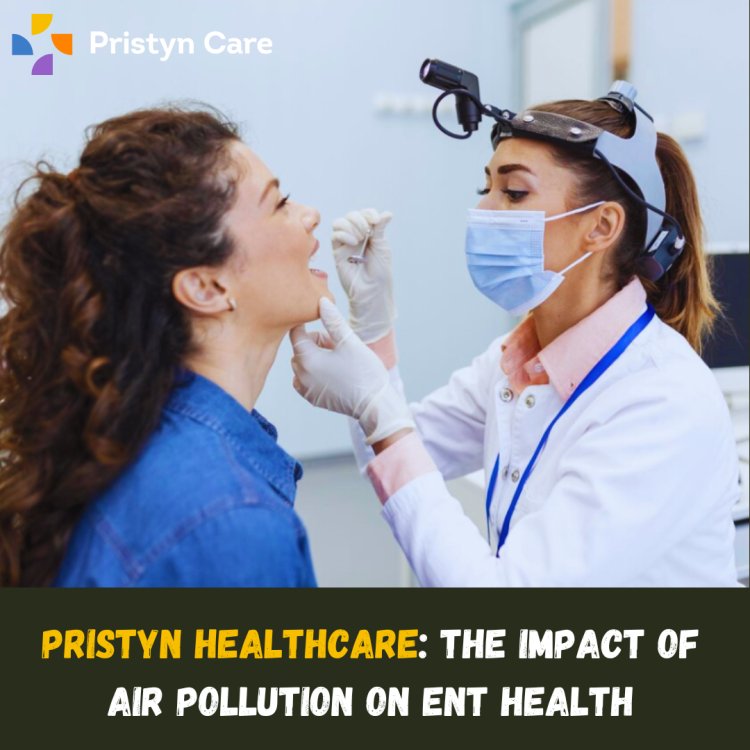Pristyn Healthcare: The Impact of Air Pollution on ENT Health
Share this Post to earn Money ( Upto ₹100 per 1000 Views )

Pristyn Care - Air pollution has become one of the leading environmental concerns in modern times, affecting not only the quality of the air we breathe but also our overall health. Among the most vulnerable to air pollution are our ears, nose, and throat (ENT), as these organs are directly exposed to environmental factors. ENT health is critical for maintaining a clear airway and proper functioning of our sensory systems, and exposure to harmful pollutants can cause various complications. This blog will explore how air pollution impacts ENT health and provide insights on preventing and managing these effects.
Understanding the Link Between Air Pollution and ENT Health
The ear, nose, and throat are vital parts of our body that are constantly exposed to the environment. As such, they are particularly vulnerable to pollutants in the air. Air pollution primarily consists of particulate matter, gases like nitrogen dioxide, sulfur dioxide, ozone, carbon monoxide, and volatile organic compounds (VOCs), all of which can irritate the sensitive linings and membranes of the ENT organs.
The exposure to these pollutants can result in a range of conditions, from minor discomforts like nasal congestion to more serious issues such as chronic respiratory diseases, hearing loss, and even throat cancer.
How Air Pollution Affects the Nose and Sinuses
The nose acts as the first line of defense against airborne pollutants, filtering the air we breathe. However, when pollution levels exceed a certain threshold, the nose struggles to filter out harmful particles. These pollutants can irritate the nasal passages, leading to chronic inflammation and congestion. Some of the most common conditions caused by air pollution include:
-
Rhinitis: Inflammation of the nasal lining, leading to a runny nose, sneezing, and congestion.
-
Sinusitis: Chronic inflammation of the sinuses, often triggered by pollutants, resulting in blocked sinuses, headaches, and facial pain.
-
Nasal Polyps: These are non-cancerous growths that can develop when the nasal passages or sinuses are inflamed for a prolonged period due to exposure to environmental pollutants.
The long-term impact of pollution on the sinuses can be severe, leading to chronic sinusitis or even permanent damage if left untreated.
The Throat and Respiratory System
The throat is another sensitive area impacted by air pollution. Pollutants such as ozone and nitrogen dioxide can irritate the throat, causing inflammation, soreness, and coughing. Prolonged exposure can also weaken the immune system, making it easier for infections like sore throats, laryngitis, and upper respiratory infections to take root.
Moreover, individuals with asthma or pre-existing lung conditions are particularly vulnerable to the effects of air pollution. These pollutants can exacerbate asthma symptoms, making it harder for individuals to breathe and increasing their likelihood of experiencing frequent asthma attacks.
Impact on the Ears and Hearing
The ears are not only responsible for hearing, but also play a key role in maintaining balance. Air pollution has been shown to contribute to conditions that affect both the auditory system and balance. Fine particulate matter (PM2.5) can travel deep into the respiratory system and enter the bloodstream, leading to inflammation that impacts ear health.
-
Ear Infections: Prolonged exposure to pollutants can weaken the body’s immune defenses, making the ear more susceptible to infections.
-
Hearing Loss: Air pollution has been linked to an increased risk of hearing loss. The toxic particles can cause inflammation in the inner ear, which may lead to irreversible damage over time.
-
Tinnitus: A persistent ringing or buzzing sound in the ear, often exacerbated by environmental pollutants like noise and air pollution.
Children and Vulnerable Groups
Children and older adults are particularly at risk when it comes to air pollution. Young children are still developing their immune systems, making them more susceptible to the harmful effects of pollutants on ENT health. Prolonged exposure to air pollution in children can lead to the early onset of respiratory problems, sinus issues, and even developmental delays in hearing.
For older adults, pre-existing health conditions, such as high blood pressure or diabetes, can worsen the impact of air pollution. In these cases, the pollution further compromises the immune system and accelerates the deterioration of ENT health.
Protecting Your ENT Health from Air Pollution
While air pollution may seem unavoidable, there are several proactive steps you can take to protect your ENT health.
-
Limit Outdoor Activities During High Pollution Periods: During times of high pollution, try to stay indoors as much as possible. Keep windows and doors closed, and avoid physical activities that may exacerbate exposure to air pollutants.
-
Use Air Purifiers: Air purifiers with HEPA filters can help reduce indoor air pollution. These devices filter out particulate matter, allergens, and other harmful particles, making it safer to breathe indoors.
-
Wear a Mask: When venturing outside, consider wearing a mask, particularly in areas with high pollution levels. N95 masks are designed to filter out fine particles, offering protection from pollutants that can impact ENT health.
-
Practice Nasal Hygiene: Regular nasal irrigation using saline solutions can help cleanse the nasal passages and remove accumulated dust and pollutants. This simple practice can prevent congestion and reduce the chances of developing infections.
-
Seek Medical Advice Early: If you notice persistent symptoms like nasal congestion, throat irritation, or ear discomfort, it’s important to seek medical advice. Early intervention can help prevent the development of chronic conditions.
ENT Treatment at Pristyn Care
If you are experiencing ENT health issues due to air pollution, Pristyn Care provides specialized treatments tailored to address the root causes effectively. Their services cover a wide range of nasal, throat, and ear conditions, including chronic sinusitis, tonsillitis, and ear infections. With minimally invasive procedures and a patient-centered approach, Pristyn Healthcare ensures safe and personalized treatment plans for everyone. The healthcare network at Pristyn Care Company is supported by highly skilled ENT specialists who prioritize the well-being of their patients.
Conclusion
Air pollution continues to be a significant environmental challenge, and its effect on ENT health is a growing concern. The pollutants that enter our bodies through the nose, mouth, and ears can lead to a range of issues from nasal congestion to hearing loss. However, by taking proactive steps to protect our ENT health and seeking timely treatment from medical professionals like those at Pristyn Care Company mitigate the damage caused by pollution. With the right care and attention, your ENT health can be safeguarded from the harmful effects of air pollution.















